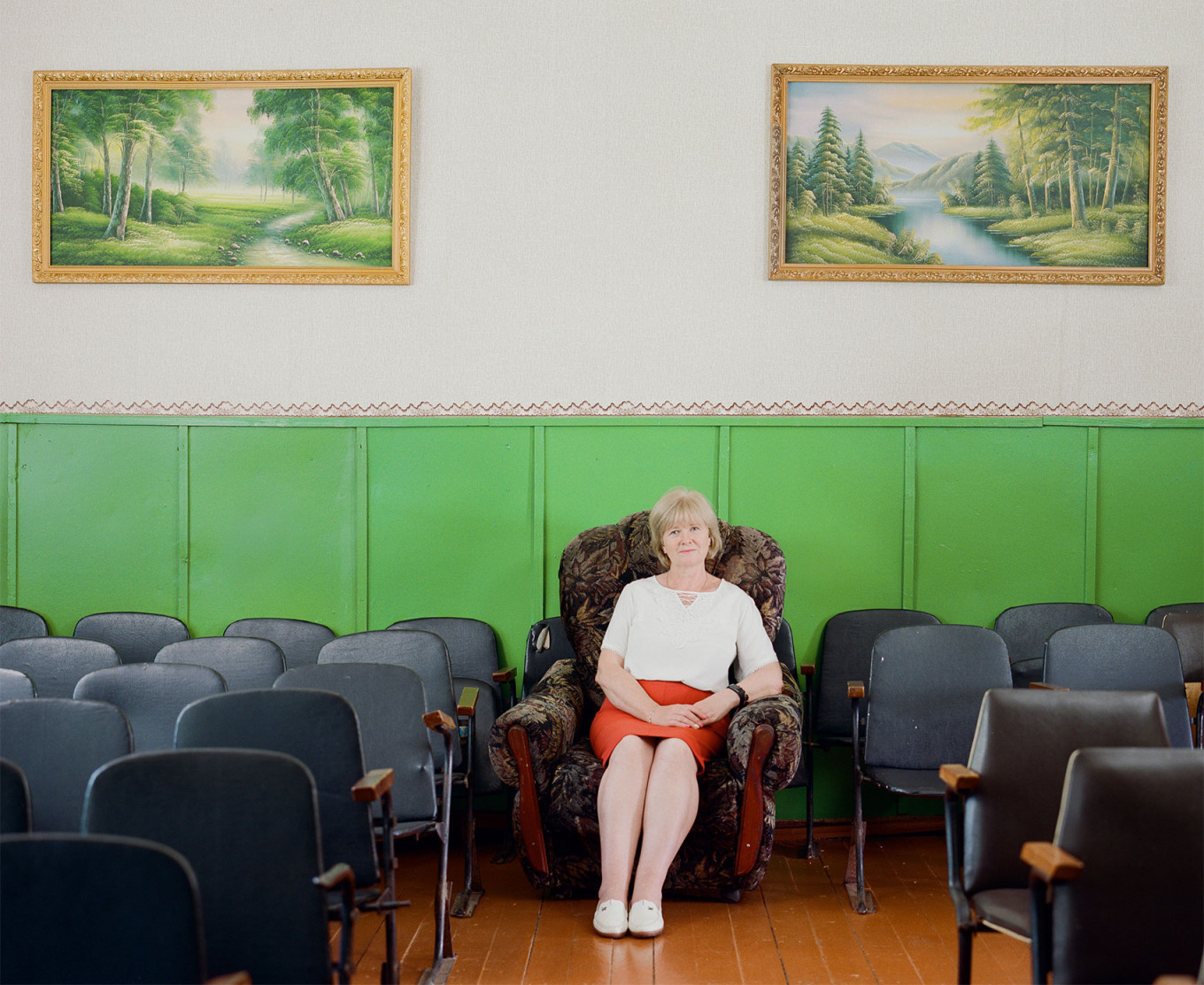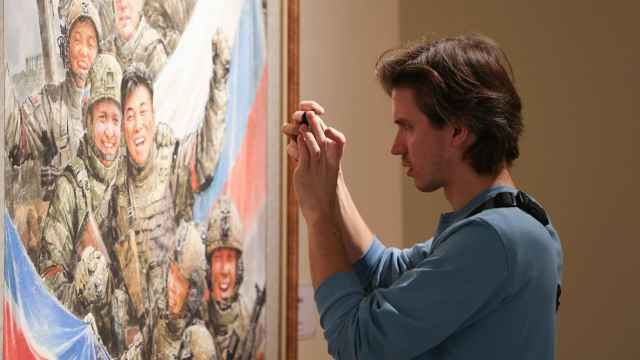A Glimpse Behind the Bookshelves in Russia's Small-Town Libraries
In Russia’s rural villages, there are very few cultural institutions. Oftentimes, there is only a single library and a single House of Culture (community center for arts and culture).
Because libraries are free to visit, they are crucial in low-income regions where people can’t afford to spend money on culture and education.
In addition to lending out books, each library acts as a center for education, cultural events and entertainment. The spaces are used for distributing news, celebrating anniversaries and holding social gatherings. Village libraries exist to preserve national traditions and historical knowledge.
Many of these libraries are managed by just one employee each, most of whom are women working part-time. They are the ones in charge of decorating these spaces, which is why each library possesses a unique interior.
Librarians compensate for the decline of interest in print books and the infrequent donations by organizing events within the library spaces such as celebrations of renowned writers' and poets' birthdays, lectures on local history, workshops and quizzes.
Yet these libraries are gradually disappearing. In five years’ time, many will be closed as the population of rural areas continues to decrease.
In the middle of making this series, it became clear to me that the focus of the project was not only the libraries themselves as much as it is the women who single-handedly carry the cultural education of their towns' residents on their backs.
Because libraries are free to visit, they are crucial in low-income regions where people can’t afford to spend money on culture and education.
In addition to lending out books, each library acts as a center for education, cultural events and entertainment. The spaces are used for distributing news, celebrating anniversaries and holding social gatherings. Village libraries exist to preserve national traditions and historical knowledge.
Many of these libraries are managed by just one employee each, most of whom are women working part-time. They are the ones in charge of decorating these spaces, which is why each library possesses a unique interior.
Librarians compensate for the decline of interest in print books and the infrequent donations by organizing events within the library spaces such as celebrations of renowned writers' and poets' birthdays, lectures on local history, workshops and quizzes.
Yet these libraries are gradually disappearing. In five years’ time, many will be closed as the population of rural areas continues to decrease.
In the middle of making this series, it became clear to me that the focus of the project was not only the libraries themselves as much as it is the women who single-handedly carry the cultural education of their towns' residents on their backs.

The Anufriev village library.
Located in the same building as the village clubhouse, the library has 99 regular readers and a collection of 1,545 books. Librarian Tatyana Sergeyevna is fond of traveling and often goes camping with her family.
Located in the same building as the village clubhouse, the library has 99 regular readers and a collection of 1,545 books. Librarian Tatyana Sergeyevna is fond of traveling and often goes camping with her family.
Ksenia Inverse

The Sabur-Machkas village library, which has 6,515 books and 482 readers.
Ksenia Inverse

The Zagorodny library branch. Zagorodny's House of Culture has a library, a large dance hall and a recently established museum of the local state farm. The recreation center was built in 1965, and the library wing was built in 1985. The library's collection consists of 6,552 copies, with 347 readers.
Ksenia Inverse

The Maksimovskaya rural library was founded in 1947 and is located in the House of Culture building. Librarian Yulia Alexandrovna occasionally performs with a folk ensemble. She also collects exhibits and studies the history of her native village for the museum room she created at the library.
Ksenia Inverse

The Nikolsky rural branch of the Gagarinsky district library system.
The Gagarinsky district of the Smolensk region is the birthplace of Yuri Gagarin, and there is a stand or a mini-museum dedicated to the first cosmonaut in the libraries of this area.
The Gagarinsky district of the Smolensk region is the birthplace of Yuri Gagarin, and there is a stand or a mini-museum dedicated to the first cosmonaut in the libraries of this area.
Ksenia Inverse

The Baskakov rural library was founded in 1948 and has 4,313 books and 240 regular readers.
Ksenia Inverse

The Ryabinkovskaya rural library was founded in 1969 by the trade union of the Rassvet breeding plant. The library serves six villages and contains 4,263 books. Librarian Raisa Omarovna is passionate about local history, collecting antiques and folk art. From this passion, the library's mini-museum was born.
Ksenia Inverse

Librarian Svetlana Viktorovna of the Bureg village library.
The library was opened before the Russian Revolution, in 1903. At the time of its founding, it had about 300 books, whereas today it has a collection of about 4,000 and 301 regular readers.
The library was opened before the Russian Revolution, in 1903. At the time of its founding, it had about 300 books, whereas today it has a collection of about 4,000 and 301 regular readers.
Ksenia Inverse

The Vostochny village library branch is located in the village club building and was built in 1983. In the hall in front of the library, a mini-museum dedicated to the izba, or Russian cottage, was organized by the librarian and the director of the House of Culture.
Ksenia Inverse

The Baskakovsky rural branch of the Gagarinsky library system is located in the local House of Culture. The number of regular readers is 399, with about 6,321 books in its collection. The library contains a local history museum.
Ksenia Inverse

The Lebedev rural library was founded in 1957. Since 1980, the library has been located in the building of a rural school, then in an office building before it was transferred to the new House of Culture.
Ksenia Inverse

The Khlepen rural library was founded in 1954, and has a collection of 4,235 copies and a readership of 181. The library is located in the House of Culture building. Librarian Lyubov Petrovna enjoys beading and gives free classes in the library for the community.
Ksenia Inverse

Out of the 422 people who live in the Alfyorovskaya rural branch library's service area, 318 have library cards, including 78 children. The library's collection consists of 10,826 volumes.
Ksenia Inverse

The Bolotnikovskaya rural library occupies one classroom in the local school building.
Ksenia Inverse

The Ryazan library branch. Despite the fact that there are now electronic catalogs almost everywhere, paper catalogs have also remained in many libraries.
Ksenia Inverse

Librarian Galina Nikolaevna has been working at the Shnyayiv village library since 1989. In 2013, she was a nominee for the first nationwide Librarian of the Year competition and won a competition by the Saratov regional Culture Ministry. She is pictured here in the Chuvash national costume, which she wears when she gives lectures for children and performs on holidays.
Ksenia Inverse

The Znamenskaya rural library branch No. 1. Librarian Larisa Alexandrovna is fond of local history and has gathered a mini-museum of antiques found among the villagers.
Ksenia Inverse

Librarian Maria Sergeyevna of the Sloboda settlement library branch No. 15 is photographed in the House of Culture, where she sometimes holds events.
Maria Sergeyevna is fond of local history. Together with readers, she restores the village's history based on available documents, letters and photographs, and records the memories of old residents together with the director of the House of Culture.
Maria Sergeyevna is fond of local history. Together with readers, she restores the village's history based on available documents, letters and photographs, and records the memories of old residents together with the director of the House of Culture.
Ksenia Inverse

Librarian Kums Zingalievna of the Lebedevskaya village library is fond of local history and regularly adds to the mini-museum of antique objects inside the library. She is also fond of photography, and she organized a veteran's group for elderly residents.
Ksenia Inverse

The Kuzinsky village library is located in the House of Culture building. Svetlana Anatolyevna is a librarian, and her husband, Vasily Ivanovich, is the director of the House of Culture. They do everything together and are always helping each other. With their efforts, a museum of local lore was established in the House of Culture building, which contains antiques, paintings by local artists and sculptures.
Ksenia Inverse

The Mokshaleiskaya village library holds 11,864 volumes and has 692 readers.
Ksenia Inverse

The Bolotnikovskaya rural library occupies one classroom in the local school building.
Ksenia Inverse

The Zhelezkovskaya rural library is located inside the local House of Culture, which was built in 1985. The book collection consists of 4,820 volumes. Librarian Natalya Vladimirovna works part-time both in the library and in the House of Culture. She was previously a teacher and director at the local school.
Ksenia Inverse

The Malomaresevskaya village library holds 4,914 volumes and has a readership of 226.
Ksenia Inverse

Librarian Larisa Alexandrovna of the Znamenskaya village library is fond of local lore and history. She organized a mini-museum of peasant life inside the library, and also updates exhibitions dedicated to historical events.
Ksenia Inverse

The Dalevsky library was founded in 1953 and contains 3,606 books with a readership of 87. A small museum with items of peasant life can be found in one of its rooms.
Ksenia Inverse

The Melnitsky rural library was opened in 1935 at the Krasnaya Zarya Knitting Artel Club.
In the 1940s, the writer Vitaly Bianchi lived nearby for several years. A small exhibition devoted to this was organized by a local historian and a librarian. The library's collection consists of 1,855 volumes (its collection is being restored after a fire) and it serves 197 readers.
In the 1940s, the writer Vitaly Bianchi lived nearby for several years. A small exhibition devoted to this was organized by a local historian and a librarian. The library's collection consists of 1,855 volumes (its collection is being restored after a fire) and it serves 197 readers.
Ksenia Inverse

The Kolosovo rural library branch No. 29 was opened in 1979 and holds 9,885 books with a readership of 585. Librarian Alla Tabaldievna is an active participant in nationwide book trailer competitions. Together with local children, she records videos, then edits them and overlays sound, effects and titles. Recently, her trailer for the book "The Reader" by Bernhard Schlink won third place in a national competition.
Ksenia Inverse





